Archive for January, 2024
Internship in Madrid
- Political Science Ma.
- Spain, Madrid
- Goethe-Institut Madrid
- 09/2023 – 12/2023
- application process
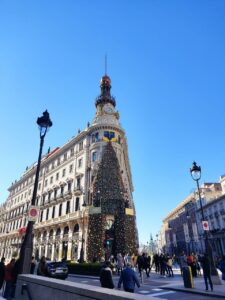
© Dinah Schmidt
I started learning Spanish during my bachelor’s degree and had long planned to spend some time in Spain. In September 2022 I applied for the three-month internship in the cultural department of the Goethe-Institut Madrid. The online application consisted of my CV, a certificate of study, and a letter of reference from one of my professors/lecturers. In addition, i was required to answer a few questions about my previous experience, my interests, and my ideas. Then, in December, I received my acceptance on time as a Christmas present. Since then, I have been improving my Spanish skills with language courses and looking forward to my stay. In the summer of 2023, as the start of my internship approached, I started to prepare myself more intensively. Among other things, I studied the history of the city and the cultural offerings and scenes. Then it all started in mid-August! I combined the outward journey with a road trip through Belgium, France, and Spain. Over three weeks, we explored the coastal strip from Bordeaux to Llanes and then travelled through the mountains to Madrid. The traffic on Madrid’s motorways is a definite turn-off!!!
- Accommodation and Living Expenses
I knew from other reports that it would be very difficult to find accommodation and that I would have to be careful not to get screwed. As I didn’t have time to travel a few weeks before the start of the internship to look for a flat on the spot (or preferred to spend the time travelling), I used the Spotahome app. This gave me the certainty that the flat definitely existed and the deposit was only transferred to the landlord after I had given feedback that the flat looked as advertised.
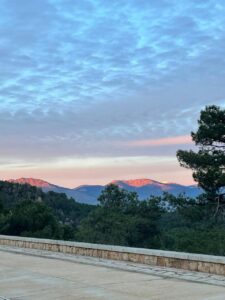
© Dinah Schmidt
Of course, this security also came at a cost. In hindsight, I would recommend looking for accommodation locally rather than from Germany – but it was important for me to have a firm commitment for a room before the start of the internship. I lived in a shared flat with four people who were all only in Madrid for a few months to study. The flat was on the edge of a very nice neighbourhood (Salamanca) on a large roundabout – fortunately in the back building. My room was very small but nicely furnished and had a window. The flat only had a small kitchen, was very noisy and all in all was not in very good condition. The rent was 570 euros per month (!!!) which is very high for this property compared to German rents. Especially when you consider the difference in income between Germany and Spain. In the end, the decisive factor for me was that the Goethe-Institut was easy to reach from the flat. It was just under 25 minutes on foot and a quarter of an hour by metro without changing trains. The cost of living was not much lower than in Germany, only bar and restaurant meals were slightly cheaper.
- Everyday life/the internship
The working hours at the institute were Monday to Friday from 9:00 to 18:00. As part of the cultural work, events were regularly scheduled in the evening, which provided a great deal of flexibility in terms of time on site. On the one hand, the internship involved several continuous tasks and,
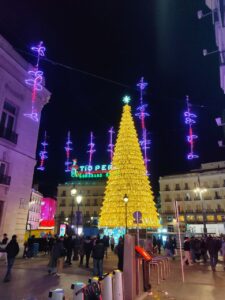
© Dinah Schmidt
on the other, offered me a wide range of opportunities to get involved in events. One regular task was to fill the Goethe-website-programme with content and revise it. I also provided support in the areas of communication and social media presence. This included creating events, application posts and reminders, but also conducting interviews with various artists/residents. Another very enjoyable and exciting task was looking after the residents and the institute’s guest flats. I had an overview of when an artist was arriving and departing and was able to welcome them. As a result, I got to know many artists (dance, theatre, cinema, sound, painting, …), theorists and researchers from all over the world during my internship. As part of the FLIPAS-project, workshops on a wide range of topics were made possible through the cooperation of several European cultural institutes in Madrid, cultural institutions and social organisations. These workshops took place in social organisations, museums or other institutes and focused on enabling young people in difficult circumstances to take part in cultural projects, establish contact with international artists, get them excited about the topics and create a great group experience together. As part of this project, I was able to take part in almost all the workshops and assist with translating and documenting them. This allowed me to get to know cultural and social centres, visit theatres and museums in Madrid’s city centre and the surrounding area, and network with a wide variety of people involved in cultural work.
- Free time & tips
The weather in Madrid was wonderful. We could sit outside until the beginning/mid-November and even in winter it was light until 6 p.m. and most days were characterised by bright sunshine. People’s rhythms start and end later than in Germany. The attitude to life is more relaxed and people get together longer in the evening and eat later and more extensively. I can definitely recommend the tapas culture. At the institute, six of us shared an office and were able to spend our breaks together and explore the city. We visited the large and smaller museums in Madrid and took the opportunity to visit some theatres and information events on various topics via the institute. The Reina Sofía Museum has a collection of recent Spanish art and exhibits documents from Spain’s history of protest – I was very impressed. I should not forget to mention the beautiful Retiro Park and the very picturesque and culturally interesting
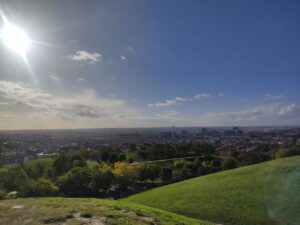
© Dinah Schmidt
neighbourhoods of Lavapiés, Malasaña and La Latina. Madrid never sleeps – In the evenings and at the weekend, I visited some of the countless beautiful bars and clubs. (Favourite bar here: La Venencia – a quaint pub with an interior from the last century, where the Republicans met during the Civil War, with good sherry and delicious tapas) On the long weekends, I went on a trip to Valencia with friends, hiked the mountain regions around Madrid (Navacerrada was very nice), visited the nearby city of Toledo and the historical memorial site “Valle de Cuelgamuros” (also highly recommended). I really liked the Tío Pío Park in the Vallecas neighbourhood for its beautiful views over the city and, of course, the views from the various rooftop bars.
- Conclusion
To summarise, I can definitely recommend an experience abroad in Madrid and an internship in the cultural department at the Goethe-Institut Madrid. I really enjoyed it and the tasks I was given enabled me to surpass myself and make lots of contacts in Madrid and Spain. This experience abroad has also made me want to take on more projects abroad in the future, especially in Spanish-speaking countries. Finally, I have grown very fond of the people I met in Madrid, and I look forward to maintaining these contacts.
Research Stay in San Sebastián
- Teaching and Research Logopedics M.Sc.
- Spain, Donostia-San Sebastián
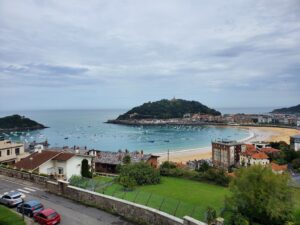
© Anne-Kathrin Mahlke
- Basque Center on Brain, Cognition and Language (BCBL)
- 09/2023 – 12/2023
- Application / Finding an Internship
Finding the group and supervisor, and even deciding to do an Erasmus+ research stay abroad was a total stroke of luck. I knew that I wanted to look into young children’s language development in my master’s research project and had been searching for suitable research groups within Germany. By chance, another student who had just returned from her own Erasmus+ research stay at the BCBL in San Sebastián in Spain reported about it in a colloquium – and talked about doing exactly the kind of research I knew I wanted to do. Then it was just a question of being brave enough to send an e-mail to the leader of the group she had worked with, asking about the possibilities for a research internship. After sending my first e-mail, I did not hear anything back for over two weeks – and almost gave up on the whole idea. Only thanks to my partner’s relentless encouragement did I bring up the courage to send a reminder – and to this day I am deeply greatful for his engouragement! I heard back from the supervisor almost immediately, and she was very open to me visiting her group!
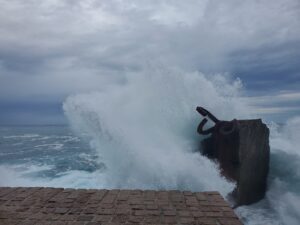
© Anne-Kathrin Mahlke
After agreeing on a time frame for my stay, extensive preparations began: we started discussing possible topics for my research project, which mostly meant a lot of paper reading on my side. I also asked one of my professors in Germany for his co-supervision, as this is required in my program. In parallel, I started the application process for the Erasmus+ support. After reading all the information on the application, this took time, but was fairly easy. I was lucky that all people involved – my supervisor in Spain, my supervisor in Germany, and the adminstrators involved – were extermely helpful and available for any questions or requirements I had.
- Accomodation & Living expenses
Although it is a smaller city, unfortunately, San Sebastián is one of the most expensive places to live in Spain, and finding accomodation is not easy. Single rooms in shared appartments can easily cost 400-600 € per month. Fortunately, my supervisor was able to connect me with a Guest House for visiting researchers, in which I not only found accomodation quickly, but which would also become the place where I found some of my closest friends during my stay. The high housing prices meant that basically my whole Erasmus+ funding went towards rent during my stay. Luckily, I had some additional funds saved, and the cost of food and everyday life in Spain is quite low.
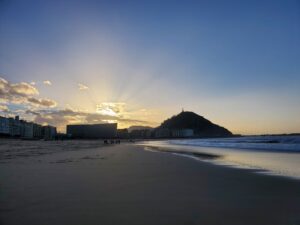
© Anne-Kathrin Mahlke
- Everyday life / The internship
As I had done a lot of theoretical preparation for my research project already in Germany, I was able to jump straight into work at the institute. Still, there was a lot to learn. I was assigned days on which I was required to help in the BabyLab, and in the first few weeks spent any free minute there in order to quickly get to know the different experiments and methodologies. Even though most families visiting the BabyLab spoke Spanish and/or Basque, and I am not fluent in either of these languages, I could quickly pick up many of the more technical tasks, or entertain the babies, for which language is not too necessary. Since I was conducting an EEG study, I also started learning the necessary data analysis methods. Between regular meetings, presentations, reading, writing, programming, and lab duties, I quickly fell into a busy, but extremely productive routine.
The group and my supervisor were great at welcoming me and including me in the proceedings at the institute. Since the BCBL is a small, close-knit community, many people came up to me, introduced themselves, and asked about my plans for the stay.
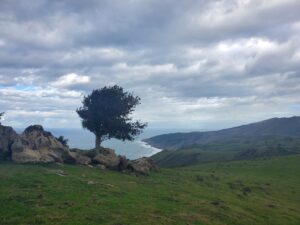
© Anne-Kathrin Mahlke
Interacting with so many people who are all interested in the same topics I am interested in, and hearing about all their amazing research was probably one of the greatest experiences during my stay at the BCBL.
My supervisor made sure to give me a lot of freedom and simulteaneously providing enough guidance for me to successfully progress through my project. I also received a lot of support from other members of the group, and have formed some great friendships. Since the group is rather new and mostly made up of PhD students and young postdocs, we were all in similar situations and could help each other, which created a great atmosphere. I am very much looking forward to watching all of them grow throughout their academic career and to meeting them at many conferences to come!
- Free time / tips
Although still relatively unknown, the Basque Country is an amazingly beautiful place with a very high quality of
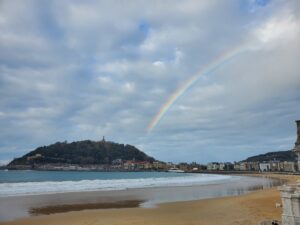
© Anne-Kathrin Mahlke
life. This is especially true for San Sebastián. Donostia (as it is called in the Basque language) has one of the highest densities of Michelin stars per inhabitant in the world, and it is hard to find a bad restaurant in the city. The culinary speciality are Pintxos, small bites of food that are usually taken with a glass of local wine. San Sebastián also provides a lively cultural scene, with exhibitions, concerts, sports events, and much more. Some of the highlights during my time there were a rowing regatta which basically became a big festival, and the San Sebastián Film Festival. A big international community provides cultural diversity, while at the same time the Basque culture and language are ubiquitous and greatly influence everyday life. Furthermore, San Sebastián has great public infratstructure with a well working and cheap public transport network and quite well connected bike lanes (even though the mountains make these a tiny bit less attractive).
For me, probably one of the most enjoyable aspects of San Sebastián and the Basque Country are its landscapes. With the atlantic ocean on one side and impressive mountains on the other side, the area provides endless opportunities for outdoor activities. Hiking, surfing, climbing, swimming – even though I only managed to do a fraction of the things I had planned to do, I enjoyed every single outing.
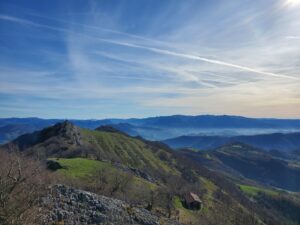
© Anne-Kathrin Mahlke
Even just hearing the waves and seeing the mountains on the horizon on my way to work made every day life a little bit better. One of my favourite things to do when stressed was to walk down from my appartment to the coast and watch the waves for a little while. Now, back to living in Cologne, I deeply miss the sea, the mountains, and the fresh air they bring.
- Conclusion
All in all, my stay in San Sebastián and at the BCBL was an extremely valuable experience. Even though it came about almost by chance, I now see it as one of the most important times during my studies, with regards to both my personal and my academic development, to the friendships and connections I have made, and to the impact it has had on my plans for my future. It is a place I will definitely return to – for holidays or even for a longer stay – and I hope to keep the connections I have made alive. I am also very happy to have helped create and uphold the connection between the BCBL and the RWTH Aachen – as I am writing this, the next student is planning her stay there – and I hope that this will become a long standing and fruitful tradition.
Research Stay in Dublin
- Chemistry M.Sc.
- Ireland, Dublin
- University College Dublin
- 11/2023 – 01/2024
- Application/Finding an internship
My experience in this department might be less useful, as I received an offer from my professor in Ireland, rather than looking for an internship myself. However, I have understood from the other visiting students there that finding an internship was not the hard part about planning their stay in Ireland – generally, they have researched the groups with topics aligning with their interests and applied directly to the head professors of those groups. Afterwards, the process ran smoothly through the school manager, who explained how I should sign as a visiting Erasmus student on the UCD website and I received a student number and card, testifying my status as a visiting student. That also meant I got access to all the facilities and privileges a student would.
- Accomodation & Living expenses
Finding accomodation might be the most difficult aspect of planning an internship in Ireland. Dublin suffers from a veritable housing crisis, which makes finding a place, especially for a short stay of under one year, extremely difficult. Aside from that, prices are high, and average around 900 to 1000 Euros a month if you don’t want to share a room. Probably one of the best options is finding a host and living in their house – not only is this option cheaper, but it also allows for deeper, personal connections with your host and the possibility of getting tips from them on the best things to visit/experience in Ireland.
This was, in fact, the option that I chose. I met my host through a previous Airbnb visit in Dublin and contacted her again for this internship. Airbnb is a safe option to find accomodation for a short-term stay, and I highly encourage you to reach out to Airbnb hosts and ask them whether they can offer longer stays. It’s a great opportunity, since you do not have to pay any deposit this way, and much more secure than many other apartment-finding websites. In fact, a fellow visiting student got scammed with his first apartment, so contacting your professor to check the validity of your apartment offer is something you should do if you have the chance to.
This entire segment might seem rather disheartening, but I assure you that the hassle is worth it. Apart from the housing expenses, which the Erasmus scholarship mostly covers, the other living expenses are very much comparable to Germany. ALDI and LIDL are readily available, and even the restaurants in the city center are very much affordable. Once you clear the hurdle of finding a place, the rest is smooth sailing.
- Everyday life/The internship
One cannot forget that Dublin is capital, and, as such, is accordingly crowded. Taking the bus at peak hours can mean your commute might be as long as two hours – thankfully, the universities are also aware of this conundrum, for which reason the PhD students start at 10 o’clock to avoid the insane morning rush. That also means, however, that your work is done around 18 o’clock, by which time you get to experience the city lit up for the night.
In my experience, everyday life is comfortable – the bus connections are fairly good and frequent, and a 90min bus ride totals up to one euro if you order the youth card online (note that it must be ordered to an Irish address). There’s something quite rewarding about watching the city from the upper level of a double decker, like you’re about to conquer the day or you’re being rewarded for your hard work. Supermarkets are always close by and offer a wide variety of semi-cooked meals that you can easily bring into work for lunch. All in all, the daily needs are met with no problem – provided that, of course, you don’t forget to bring a power outlet adaptor, just as you would if you were to visit UK.
The university staff at UCD and the students I came in contact with were another highlight of my stay in Dublin. They’ve all been exceedingly nice and friendly, and any question, whether personal or science-related, was met with a helpful response. In one word, I would describe the people as warm – as soon as my first day, lunch discussions drifted towards restaurant recommendations and folk stories, so it’s fair to say that I have felt accepted into the group very fast.
In fact, my entire research felt like a collaboration. There was a constant exchange of ideas with the other students, and they were always ready and happy to help. I must, however, note that the scientific department was in the middle of reorganizing, so some of the facilities were harder or slower to access.
Another thing to notice is the clear difference between a PhD in Germany versus Ireland. In Ireland, the PhD is a four-year endeavor and no more – you are considered a student, and as such have a contract for only these four years. Regardless of the results you’ve obtained or how much progress you’ve made, your project time is up after four years, and there’s not much pressure to publish scientific papers. This, I’ve come to understand, is a double-edged sword: on the one hand, the atmosphere is much more relaxed and much less competitive than other academic experiences I’ve had. On the other hand, there’s not a general drive to improve, which may shackle you down if you do not have the support of your professor.
- Free time/Tips
Dublin is truly a charming city. Just taking a walk through the city center reveals centuries of history in its layered architecture, from the Middle Ages to the beloved pubs and more modern bubble tea shops. It’s fascinating to experience – as soon as you step into the city, everything is red bricks and old, authentic facades. It might be one of the most beautiful capitals I’ve seen so far, and one that offers much to do in your free time.
If you’re inclined to visit museums, there’s no shortage to choose from. From Dublina, which explains the relationship between Dublin and Vikings, to The Little Museum of Dublin, which takes you on a time travel back to the Irish war of independence and, most importantly, the Whiskey Museum – Ireland is so culturally diverse that you have no chance of getting bored. There’s a particularly strong drinking culture in Ireland, so apart from the Whiskey Museum, which serves as an entrance guide, there are more Whiskey Distilleries to visit than you can count. I ended up at Teeling, and absolutely loved the tour and the complementary whiskey plus cocktail.
If there is one word often associated with Dublin, however, that is beer – they are more than proud of the Guinness Brewery, and it is worth a visit just for its impressive size if panoramic view from the top restaurant, even if you aren’t much of a beer enjoyer. If you are, however, you’re in luck, because Dublin is bustling with dozens of pubs, where you can enjoy a pint of beer while listening to live music and eating an Irish roast.
Another must is enjoying a cup of tea and a scone – it doesn’t matter where, because you’ll find them everywhere. Just like mince pies, these are remnants of the 800-year long British occupation. If you go to the port, Howth, you’ll be able to not only enjoy the amazing hikes, but also fresh fish and chips. Despite this strong British influence, Ireland is the very definition of a multicultural city – people from so many walks of life have settled here that you can find virtually any cuisine you’re craving, be it Japanese, Mexican, Greek, Korean or Italian.
Ireland is also known for its nature – if you rent a bike, it’s worth taking it outside of the city to see the beautiful landscape. If you don’t, however, you can still rent one in Phoenix Park, another must-visit on your list, if only to see the deer. You might have to search a little for them, and the park is extremely big, but definitely worth a visit.
- Conclusions
All in all, I would rate my experience at UCD, and in Dublin, in general, as positive. UCD was well-equipped from a scientific point of view, and depending on the research field that you want to deepen your understanding of, it might make a great experience to add to your resume. The people were very helpful, even though the general level of research-motivation was below what I was expecting.
The city itself was wonderful. I was lucky enough to be there around Christmas and enjoyed Dublin in all of its festive glory. The atmosphere pulls you right in, and it makes it easy to forget that you’re far away from home. The people were very warm and friendly, and I was lucky enough to have a pair of wonderful hosts that I would engage in many a conversation with. The openness to foreign visitors and the ease with which I was accommodate made it so that Dublin is now one of my favorite places in Europe, and I can’t wait to return as a tourist.
Hospital internship in Cyprus
- Medicine
- Cyprus, Nicosia
- General Hospital of Nicosia
- 09/2023 – 12/2023
Application/Finding an internship:
Where to begin and where to end describing this amazing journey, all thanks to the Erasmus+-Internship program. Well, I know how, I am going to take it from the start. Upon deciding that I wanted to pursue this route, I knew I should start contacting the right people at key positions that would help me start the process. One of those Administrators included the person who is responsible for all exchange programs that concern the medical school at the RWTH University in Aachen. Together we put a roadmap down to catch up with the deadlines in the application process. Next stop was getting in touch with the Faculty of Medicine at the University of Cyprus and selecting an academic Mentor/Professor at the Nicosia General Hospital, who would oversee my education and training and provide me with the all the valuable feedback to overcome every challenge. I wanted to do a surgical internship in Cyprus, because I felt it would benefit me the most. I contacted a renowned surgeon in Cyprus, who is at the same time Professor of Surgery at the medical faculty. I was quite surprised by how quickly he responded to my emails, knowing how the bureaucracy makes it a painful process to get something done sometimes. He pointed me to the corresponding Administrators, and we all signed the Learning Agreement, noting down my responsibilities and duties as an Intern at the hospital. The next part of the process consisted of applying for the grant, which was actually straightforward.
Accommodation & Living expenses:
I arranged my accommodation as soon I got an acceptance offer from the Erasmus+-Program, which consisted of renting a small apartment in a private student dormitory intended for students at the University of Cyprus. Albeit small, the apartment covered every need and came with the added benefit of providing ample socialising opportunities, like several common areas, a gym and study halls. These four months I am proud to say that I have built strong relationships and friendships even with many fellow students and roommates, with whom I share many blissful, never-to-be-forgotten experiences. Cyprus is a cheap country to live in, so one would expect to pay less for groceries and rent as the main expenses compared to central European countries like Germany, where I am currently studying. All utilities were included in the rent, which was about 500 Euros per month.
Everyday life/ the internship:
My everyday life comprised taking the bus to the hospital, arriving sharp before 8am. At 8am a hand-over meeting takes place at the General Surgery Department at the Nicosia General Hospital, during which the on-call Physicians receive all relevant information regarding new patients admitted in the ward or seen by surgeon specialists and any important updates concerning existing in-ward patients. This meeting was also the perfect opportunity for senior physicians to partake in medical discourse relating to patients’ treatment plans and imaging findings. What followed next were ward-rounds. Me, as well as the other medical students from the University of Cyprus regularly got the chance to present our patients during rounds and answered questions regarding their medical history, current presentation, clinical and radiological findings and take care of any tasks concerning our patients such as prescribing and administering medications. We were asked to perform clinical examinations and elaborate on symptomology and to came up with an optimal treatment course for them. This course of action has been crucial in providing me with much-valued feedback from esteemed medical professionals and improving my communication and decision-making skills. Upon completion of the rounds, we were all assigned numerous tasks related to our patients, for example requesting consultations from other specialists, collecting blood samples or cultures, arterial blood gases (ABG) and of course documentation of the ward round. Some of us were included in the OR Scheduling, so we had to be ready before the hand-over meeting and to assist in surgeries. Words cannot describe the amazing experience of the Operating Theatre. It is truly quite a different word, especially for someone like who, due to the Covid19 pandemic, had only little exposure to surgical specialties. There, I was able to perform some basic suturing under the guidance of residents of the department. Due to my choice to follow Neurology as my specialty, this was a once in a lifetime opportunity for me to explore the interesting world of Surgery and I am proud to say I grew fond of it over time, something I never expected. As part of our academic plan, we were also able to shadow consultants and residents in specialized centres like the breast cancer and thyroid cancer centre and thus deepen our understanding of the concerning complicated diseases and their treatment. I got to practise performing ultrasound examinations as well, a skill crucial to every Doctor. Apart from that, I should note that the staff on ward was quite helpful, always willing to lend a hand, especially the first few weeks before I got accustomed to the setting. The internship also provided opportunities for active participation in clinical research. My Involvement in a project aimed at improving patient care expanded my research skills and deepened my interest in evidence-based medicine.
Free time/tips:
After the hospital, I was dedicated to fully experience this beautiful Mediterranean island with quite a lot to offer. Getting to the beach from the capital was an easy feat, with regular bus service connecting the busy hub with dreamy seaside destinations like Protaras, Ayia Napa, Larnaca and Limassol. As it is known, Cyprus boasts one of the mildest climates in Europe so a swim even in December was possible and really enjoyable. As far as history and culture are concerned, Cyprus has also quite a lot to offer with ancient monuments, cites and castles. When I opted to stay in Nicosia for the weekend, I was busy exploring the capital and its old and new counterparts and attending happenings all around the city. Nicosia is truly one of kind as it is sadly the last remaining divided capital in the world. A walk around the barricades and fences leaves you with an uneasy feeling, curious and eery enough to spark some interest in exploring the history of the division of the Island and the suffering it has inflicted on its people. One should not miss the plethora of restaurants that are popping all over town, I personally recommend Picnic and Tocayo with their excellent wine and cocktail menu as well as their delicious food offerings. Another restaurant I consider a must-visit is Zanettos tavern in the old town where one could indulge in the rich Cypriot cuisine as well as enjoy lovely traditional live music. Just don’t forget to put your dance shoes on, cause a night in a traditional tavern always guarantees quite a lot of dancing!
Conclusion:
In conclusion, I would gladly recommend the General Surgery department at the Nicosia General Hospital for any medical student, who wishes to experience this island-country that I personally believe could also be called a paradise on earth and wishes to gain some much-needed insights about the medical profession! My Erasmus internship at the NGH was truly a life-changing experience and I am deeply grateful for the support from Erasmus+, which provided me with this unique opportunity, and I look forward to incorporating the gained experiences into my future medical practice.
Working at a hospital in Montpellier
- Medicine
- France, Montpellier
- Université de Montpellier
- 09/2023 – 12/2023
- Application/Finding an internship
Having grown up in France, I had known for a long time I wanted to experience the French healthcare system first-hand. I wanted to find a hospital with a pediatric surgery department, since this was a speciality I was interested in finding out more about and which is not available in Aachen. Since the RWTH medical faculty recommends we spend half of the four-month surgical rotation in general surgery, I applied for two months in ‘chirurgie digestive’ at St Éloi hospital and two months in ‘chirurgie pédiatrique orthopédique et plastique’ at Lapeyronie hospital, which are both part of the CHU de Montpellier (Montpellier University Hospital). I chose Montpellier because of its good reviews on PJ Ranking and because I thought it would be nice to spend the winter in a warmer part of Europe.
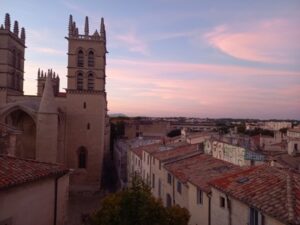
© Olivia Constanze Peel
To apply for a placement (‘stage’) in at the University of Montpellier, you first must contact the head of the relevant department (‘chef de service’) directly sending your CV and cover letter. I did this about a year and a half beforehand, although I know others applied at a much later date. Since there is a considerable amount of paperwork to sort out, I recommend applying far enough in advance. If your application is accepted, you then send the ‘chef de service’ the so-called ‘formulaire unique’ which can be found on the university’s website. Once signed, you send the document to the person responsible for international relations at the University of Montpellier. He then informs you of the next steps to take.
- Accomodation & Living expenses
I found my accommodation privately after going through all the websites (e.g., https://www.leboncoin.fr, https://www.seloger.com, https://www.lacartedescolocs.fr, https://www.appartager.com, etc.) the person responsible for international relations
sent me by email. University accommodation (‘résidence universitaire’ or ‘logement CROUS’) should be available if you express interest early enough. This is much cheaper than private accommodation, which is difficult to find for under 500 euros per month.
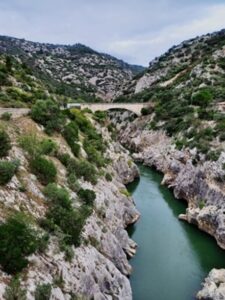
© Olivia Constanze Peel
ESN (Erasmus Student Network) has helpful housing advice and information on their Instagram page on how to plan ahead and avoid scams.
Living expenses are similar to those in Germany, although I would say food shopping was more expensive. I chose to buy a second-hand bike to be more flexible, and because it was a cheaper option than to use public transport. I travelled between Aachen and Montpellier in September and December by train, which only takes between 6.5 and 7.5 hours depending on the connection in Paris.
- Everyday life/ the internship
I spent September and October at St Éloi hospital in general surgery, and November and December at Lapeyronie hospital in pediatric surgery. The day started at 8:00 and 7:45 in general and pediatric surgery respectively and ended on average between 4 and 5pm. In general surgery there was a ‘staff’ (handover meeting) every Monday at 8am. In pediatric surgery there was a daily meeting at 7:45 with the pediatric orthopedic surgeons and every Monday at 16:30 with the pediatric plastic surgeons (speech therapists, a psychologist and members of the dental and maxillofacial departments were also present to discuss patients as a team) and the meeting often included teaching for students. I sometimes worked longer hours depending on the operating plan.
In both rotations students (‘externes’) could assist in the operating theatre, follow the junior doctors (‘internes’) on ward rounds or take part in consultations. Students were asked to organise a rotation plan each week to ensure there was a least one student per operating theatre. If you showed enough interest, you were often able to do the sutures at the end of an operation,and even carry out small procedures under supervision.
There was also the opportunity to follow the on-call doctor as part of their 24-hour shift. This involved seeing patients in A&E (‘aux urgences’), assisting in emergency operations, and in pediatric orthopedic surgery learning how to do plaster casts. I particularly enjoyed my second placement working with children and the variety of cases and surgeries I saw. These included various fractures, craniosynostoses, haemangiomas, cleft palates, dermal naevi, syndactyly, hexadactyly, clubfeet, hip dysplasia etc. Like the French ‘externes’ we were able to have lunch for free at the ‘internat’ (a separate building where some junior doctors lived, most doctors had lunch and lots of coffee was consumed when there was time to rush over between two operations). I really enjoyed the variety of the work and was lucky to work with great teams in both hospitals, which was a massive bonus.
- Free time/tips
There is so much to do in Montpellier, and the Erasmus community is huge. Since I spent most of my free time training with a local triathlon club I cannot say much from experience, but I know from the daily (at times hundreds of) messages in the Erasmus WhatsApp group (they had to create a second one because there were so many international students!) that there was a wide variety of events organised for students including pub nights, sports events, volunteering opportunities, cookery classes etc. On their Instagram page they publish a calendar every month with events pretty much every day, some of which are free. If you buy an ESN card, you can get some of the events at a discount. The card also gives
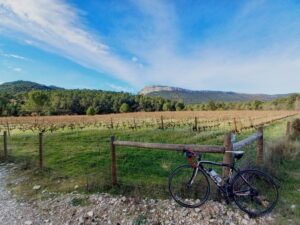
© Olivia Constanze Peel
you discounts for sport, food, bars and travel (e.g., Ryanair and Flixbus).
As of 21st December 2023, public transport was made free for residents in Montpellier (you have to apply for a card with TaM https://www.tam-voyages.com/index.asp and justify residency). However, I would recommend buying a second-hand bike either through the ESN Facebook or WhatsApp group, or on https://www.leboncoin.fr and selling it when you leave. Investing in two locks is a good idea since there is a lot of bike theft in Montpellier (it is quite common to see bikes around town missing various parts). I never used the tram, but they always seemed very full even before public transport was made free.
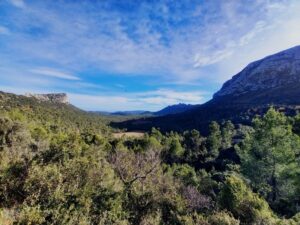
© Olivia Constanze Peel
Most of my free time was spent training with a triathlon club I had contacted before arriving. I went swimming most mornings before work, took part in running training a couple of times a week in the evenings and at the weekend there were always club rides organised. I personally really enjoyed cycling with the group and discovering the countryside and villages north and east of Montpellier. I would recommend visiting the Pic St Loup – if you can’t cycle there then I think the ESN group organised a day trip there for a hike. The views are amazing! Another ride I really enjoyed was to the Col des Lavagnes and the Pont du Diable.
At the beginning of September there was an event called ‘Antigone des Associations’ in the Antigone neighbourhood where all sorts of different clubs and societies were on site representing their organisation and to answer questions. These included sports, culture, philosophy and religion, health, education, dancing, animal welfare, the environment and much more. I went with a friend I met on my placement, and we both thought there was basically a club/society for almost everything you could think of doing in your spare time!
- Conclusion
I would absolutely recommend Montpellier University Hospital for an Erasmus internship. As well as gaining practical skills in surgery, I learnt a lot hearing from doctors’ experiences in different medical specialties and countries, which made me reflect on which path I wish to pursue and consider certain aspects of my future career differently. Being confident and a having a good level in French is an advantage to manage the fast-paced day in surgery, to fit in with the team and to take away as much as possible from the experience.
Research stay at the University of Oxford
- Business Administration and Engineering Mechanical Engineering M.Sc.
- United Kingdom, Oxford
- University of Oxford
- 04/2023 – 06/2023
Application/Finding an internship
During my master’s studies I developed an interest into various mathematical tools to model economic processes. Since I also wanted to take the chance to spend some more time abroad at the end of my studies, I decided to look for interesting chairs and institutes that align with my research interests to conduct my master thesis. Since the topic I was looking for was rather niche, there weren’t that many opportunities available and I quickly stumbled upon a research group at the University of Oxford after simple research on recent publicati
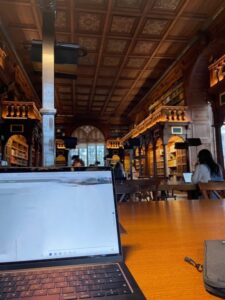
The reading room in the Old Bodleian Library.
© Jonas Schmänk
ons in my area of interest. With some background information on the coursework I have done previously and the research questions I was interested in, I reached out the administration of the institute. Luckily, two researchers reached out to me afterwards, stating that they have received my inquiry and would be happy to support the research for my thesis. After that, only some simple formalities had to be done for me to get an access card (“Bod card”) to the Universities’ libraries. I decided to physically stay in Oxford for the duration of one trimester (~2 months) since this didn’t require me to pay any fees to the University. This was a specific characteristic of the program of the receiving institute and does not necessarily hold true for other faculties as far as I know, so that should be kept in mind. The more “official” framework in which research stays in Oxford are processed through is the status of being a “recognised student”, which does require the payment of significant fees.
Accommodation & Living expenses
The University of Oxford consists of various colleges that typically provide for accommodation and food. Since I was a visitor to a specific institute and not a recognised student, it was unclear in the beginning whether I could make use of these services. Therefore, I decided to look for private accommodation. My receiving institute provided me with a short list of some possible opportunities and I decided to stay at the Commonwealth House, a well-located shared house affiliated with a local church at the rate of roughly 750 GBP a month including a simple but totally sufficient breakfast during weekdays in a common room with other tenants. While this seemed very pricey to me initially, this rate is more at the cheaper end in the center of Oxford and is similar to the ones that are paid for for college accommodation. Overall, I was content with the accommodation but for a prolonged period one might be better off with a different place, since the sanitary facilities and the kitchen were often in rather poor condition. As I found out later, often enough colleges do have some limited availability of rooms for non-members. To find out about that, a short email to the responsible person at the college is sufficient.
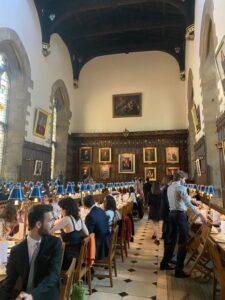
The dining hall at New College.
© Jonas Schmänk
As mentioned, breakfast was included most of the time at my accommodation. For lunch, one typically went to one of the very beautiful dining halls at the colleges, where a meal was available for between roughly 3.5-5 GBP. Groceries in the supermarket were available for a small premium compared to German prices. Overall, the ERASMUS scholarship made up for any additional expenses compared to my German student life.
Everyday life/ the internship
During my time in Oxford, I was highly flexible regarding my schedule. Typically, I started working at around 9:30 am and left at 17:30. While I had a work desk available at my institute, I often went to one of the beautiful old libraries Oxford has to offer. Since I worked on a rather programming-heavy task which didn’t require any other infrastructure than my laptop I was very flexible on where to work. Once a week, I met with my supervisors to discuss my progress and any open questions. Apart from the thesis-related tasks, I was able to join the seminars at my group, which included visits from various academics or presentations from group members regarding their current research.
Free time/tips
The possibility of activities outside of studying are almost overwhelming during term time. For once, there is probably a student society for any kind of interest. Let it be the Wine Society with frequent wine tastings, the Diplomatic Society with visits from international diplomats or the German Society with Germany-related pub quizzes, there are plenty of things to do. Furthermore, one should look out for associate memberships at one of the
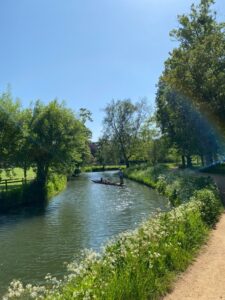
Punting through Christ Church Meadows.
© Jonas Schmänk
colleges if one is not affiliated with any of them as a regular or recognised student. The colleges offer further social activities, that are split between undergrads in the Junior Common Room (JCR) and grad students in the Middle Common Room (MCR). To find out about possibilities to join them as an associate member, one should look for the respective constitution by just googling a specific college + “MCR” [or JCR, depending on where you are in your studies] + “constitution”. Luckily, I had the chance to join New College as an associate member and therefore gained access to their activities as well, with the most noteworthy being the chance to attend their formal dinners. While these came at a cost of roughly 25 GBP, they provided a three-course meal of very high quality and the chance to mingle with other people and bring friends from other colleges. Typically, a suit or cocktail dress was obligatory for these dinners. Also, the colleges often have their own sports grounds where one can play tennis, squash or even rent a boat to go punting. The latter is something that is definitely to be done when in Oxford. The many canals and rivers provide a very scenic view on the city and the nature surrounding it. Furthermore, the University itself has a vast array of interesting talks and speeches by renowned academics which opens up further opportunities to spend free time on.
If one finds time for other things to do, Oxford also offers many nice museums, medieval colleges and pubs (my favorite being The Old Bookbinders) to explore during the day or in the evening. Also, the surroundings are worthwhile a visit. London is only a 1.5-hour bus ride away as well. I personally found it hard to find time for activities outside of Oxford during my limited time there, since the city itself has so much to offer.
Conclusion
Overall, I can highly recommend an academic stay in Oxford. Not only does the renowned university attract interesting and diverse people from all over the world, but the city also has a unique charm with its medieval colleges and libraries, creating an unparalleled atmosphere.
Wonderful Erasmus stay in Madrid
- Chemistry M.Sc.
- Spain, Madrid
- Centro de Astrobiología (CSIC/INTA)
- 09/2023 – 12/2023
Application/Finding an internship
I wanted to go for astrochemistry. That’s the one thing I had in mind when going through all sorts of research institutes in Europe which promised somewhat better weather than Germany. Then, a warm autumn night in Spain must be the perfect addition for stargazing. Eventually, I wrote an email to the Center for Astrobiology (CAB) in Madrid, where I reached out to the Head of the Interstellar and Circumstellar Medium Group. He happily accepted my application and offered me to stay for a research internship in his group. The CAB is a subdivision of the Instituto Nacional de Técnica Aeroespacial INTA, a state institution. There, lots of paperwork and filings were required, but eventually, my stay was official and my badge was ready. Now let’s go, from Aachen to Madrid.
Accommodation & Living Expenses
The campus of INTA and CAB, positioned in the far outer circles of Madrid, and more close to the smaller towns of Alcala de Henares and Torrejón de Ardoz, made me take a 45-minute bus ride from Madrid every morning. I could have chosen to live in the smaller towns. but would I want to miss, living in the centre of one of the biggest metropoles of Europe? Definitely not! I got myself a flat via the local agency viveyestudia.com, which focuses on accommodations for international students. I had a good correspondence with their agent and got a good comparable price(485€ per month). I went to live with 3 other students from all over the world and immediately made good friends with them.
Madrid itself is huge. I may repeat this, Madrid is huge. Even if the Madrid Metro system is one of the best I personally know, it is still good to live in a well-accessible area. My flat was close to Plaza de Manuel Becerra, a crossing of two highly important Metro lines (2 and 6) and a lively but not hectic area. Perfect to reach everything and still not drowning in the noise of the city. Additionally, the metro is wonderfully cheap and extremely powerful to get everywhere, even far outside of the city with no further expenses (Toledo, El Escorial or the Sierra de Guadarrama) Get yourself a Personal card (TTP) as early as possible and pay 8€ or 20€ per 30 days to get pretty much everything!
To taste some of the best local Spanish culinaries I often went out to pay the extra money but never felt overwhelmed by any prices for food or drinks. Especially for buying groceries and cooking in our own kitchen seemed wonderfully inexpensive (at least in comparison to Germany)
The general culture in Madrid is perhaps the best aspect regarding money and expenses, as most museums, palaces, or other cultural sites are either free or highly subsidized.
Everyday life/ the internship
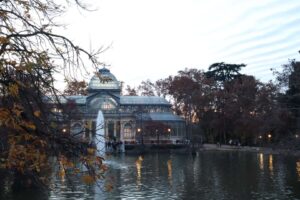
The Glass Palace
© Timon Francis Kielgas
Every morning, during weekdays, there was exactly one bus to get me to CAB. 7:15 in the morning gloom, was when I hoped on to snooze for another bit until I started my day in my Lab at 8. My days either consist of planning or analyzing data from experiments or emptying cups of coffee while letting a simple question about space evolve into a one-hour discussion remotely tangential to my research. Then, perhaps my biggest personal cultural shock, we had lunchtime at 2 p.m., way too late in my opinion, but that’s the Spanish way I was told.
On days when I was absent from the CAB, the weekend and luckily lots of Spanish holidays late in the year, I was adamant, that it is impossible to see everything in Madrid in just three months. After three months this still held true. I spend days on end wandering through Retiro Park, the Prado Museum or the endless bars and tapas places of Malasaña, always finding something new.
Free time/tips
One of the most important things, and as said before, get a Personal card (TTP) for the Metro, as early as possible, because it is that damn good to get around with. To get a great first impression of Madrid I highly recommend the Faro de Moncloa, a tower with a breathtaking observation deck, from which all the important sites of Madrid and its surroundings are visible. Another thing is the Gran Via, which itself is no secret tip because it is THE tourist hotspot. But you have to look up the dates of some special occasion when the Gran Via is closed down for cars to have pedestrians walk all over the place. It’s a wonderful way to observe the vibrant road in a completely different way.
While walking the streets of the Spanish capital, at no point you will go sparse on Spanish European culture. Especially then you have to keep in mind that Madrid is also strongly connected to all the other countries in the Spanish-speaking world of Latin America. If, like me, who has not been to South America before, Madrid is a wonderful place to dive into these cultures as well. Order some Pisco Sour in a Peruvian bar, get a plate of the best Columbian dishes to fill you up or try all the empanadas you can find.
Conclusion
Madrid is a beautiful city, with beautiful weather and wonderful research and researchers. Perhaps my most ambiguous but most remarkable impression was, that everyone I met was super friendly and a joy to be with. While the culture is bright and interesting and the city life is vibrant and beautiful, it was the people I got to work and live with, who made this whole stay the best. I can not tell if it is the field of Astrosciences, if it is the attitude or the people there in Spain, or if it is just pure coincidence, but doing research in this group at CAB just felt good!
I hope others will come to Madrid, have a wonderful Erasmus stay, and share my experience.
Internship in Trondheim
- Biology M.Sc.
- Norway, Trondheim
- St. Olavs Hospital, Trondhiem
- 06/2023 – 11/2023
Before the stay (planning, visa, vaccinations, travel, …):
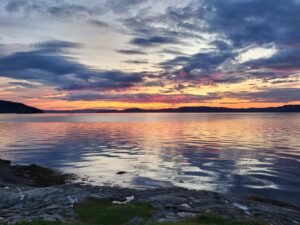
© Leona Grundel
I started an internship at St. Olavs hospital in Trondheim, which is the university hospital of NTNU,
after already spending the summer semester at NTNU. I therefore had arrived in January already
and had therefore already spend a long winter and beautiful spring their.
Regarding finding accommodation in Trondheim, the student welfare organization SIT organizes
student housing for incoming Erasmus people. Those accommodations are generally cheaper
(while I was there around 4500 NOK) than rooms on the private market (generally between 5500-
7500 NOK).
If you plan on spending the spring semester in Trondheim, your chances are good to get a place
with SIT. If you are not a student, you would have to find something on the private market, which
unfortunately usually just offers 12-months leases (July to July), few 6-months leases (July to
January; January-June) and almost never shorter leases.
Arriving in the fall semester is more difficult. Spots are very limited, and you may want to check
out the private marked. But if you like the adrenaline rush and the suspense, you can also wait
until just two weeks before you are supposed to arrive in Trondheim. I know of some people that
still got a spot with SIT this close to their departure date. NTNU and SIT are a bit last minute that
way. But speaking from experience, not everyone gets a place with SIT in fall semester.
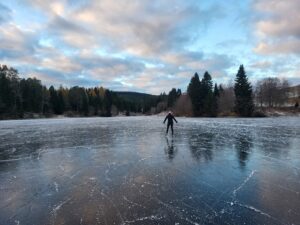
© Leona Grundel
Unfortunately, the private market housing situation in fall is not ideal either as explained above.
Also, if you extent after having started your semester abroad, be ware that, at least for an
extension into the fall semester, SIT is not guaranteeing you a place to stay. There priority is to
make space for the newly arriving exchange students which do not have the chance to go room
hunting on site.
With all the hustling around finding housing and doing all the Erasmus paperwork, the departure
time arrives quickly. Especially when arriving in summer I recommend planning a longer trip on
your way up north and visit Norway west coast or checking out Denmark and Sweden. You could
do the same if you arrive in winter but its much less fun. It’s going to be dark 80 % of the time
anyways, although I have to admit, that snowy Norway looks breathtaking.
I decided to drive up the 21 h to Trondheim with my car because I wanted to have the opportunity
to spontaneously go on road trips and other places. Although Norway in the middle of winter is
icy and snowy, the ‘’highway’’ E6 is usually ok to be driven. But it is a one lane street leading over,
around and through mountains, so in case of fresh snow you might have to wait a bit until the
streets are cleared. However, it was still cold and sometimes we drove for hours without seeing
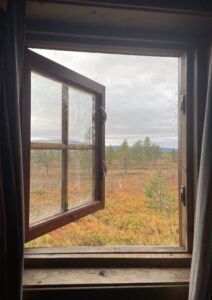
© Leona Grundel
car, while it was down to -18°C outside.
Having a car in Trondheim was especially useful since I did not have to rely on others or the public
transport to go on road trips or cabins that were further away, but you can do a lot of stuff without
one as well. Public transport in the city area is really good, and if you plan ahead you can also
reach places in the periphery a couple hour away (Just make sure to check the time table
beforehand, some bus lines drive sparsely on Sundays). And even if you want to go somewhere
where there is no good public transport connection, there are tones of Facebook groups in which
you will find yourself new friends that have cars:D Speaking of Facebook: You’ll need it.
Everything relies on Facebook: Every restaurant or club as a Facebook page (or Instagram
account) and NTNUI groups (NTNUs sports group, of which there is every sport you can imagine)
communicate and inform through it. Also, you’ll need an empty phones storage when coming
here. There are apps required for everything – laundry, NTNUI sports groups, for identification,
public transport, your student ID, renting cars…
Experience in the host country (accommodation, daily life, free time, …):
Trondheim is a bit like Aachen – a moderately sized student city with great surrounding nature.
Living in Moholt, one of the main student villages (‘’studentby’’), was awesome. This is where the
biggest chunk of Erasmus people lives. It is therefore the center of the Erasmus life. You can
spontaneously meet up in someone’s apartment (if the roomies are ok with it of course) and spend
a fun night hanging out, cooking together or drinking. But be ware, stores don’t sell alcohol after
8 pm on weekdays and 6 pm on weekends.
Next to a washing room, there are also a grocery store, a library, a café/restaurant, a gym and
even a hairdresser on the premises. Without leaving the student city you can do a BBQ, play
beach volleyball, or hang out at ‘’Lofted’’ (the common room) to play table tennis, play board
games or study (they have free coffee!).
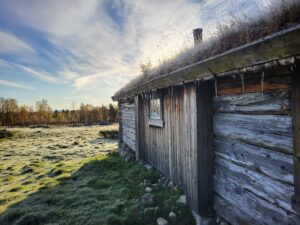
© Leona Grundel
On more thing that I really appreciate are the student run rental organizations. Check out what
the university offers, since some of these can also be used/accessed by non-students. ‘’Restore’’,
for example, is located in Moholt studentby. They collect and hand out donated furniture and
equipment to students for free. If you get one of the limited spots on their opening days you can
get everything from stools and desks to bed covers to plates and cutlery to bikes and what not.
At the end of your stay, you can easily bring that stuff back so that future exchange student benefit
from them.
Furthermore, “Bumerang” is located in Moholt studentby. They rent out everything you may need
for the outdoors for free, from tents to skies & snowboards to ice skates to fishing rods. The same
goes for the non-profit organization ‘’BUA’’. In winter, lakes are usually frozen so you can
spontaneously go ice skating there and the fjord is perfect to try out fishing or just spend the long
midsummer nights there with good food and some friends.
Continuing with the student run organizations, the “Koiene” group allows NTNUI members to rent
out their cabins in Trøndelag. Their cabins are super basic, no electricity or running water, but it
is a great way to spend a weekend away and out in nature with your friends. Here are some
pictures so you can see how beautiful it is out there. Also in fall and winter, some cabins are
perfectly located far away from any light pollution to stay up late and, with a bit of luck, see
northern lights.
Experience at the host institution (professional, cultural, …):
The internship that I did was actually my Master’s Thesis. I therefore spend most of my time at
Campus Øya in the laboratory of St. Olavs hospital. I really recommend working in their
laboratories if possible since their laboratory equipment is modern. I learned a lot, not just
academically but also about differences in how institutions are run. Be aware that there are
differences in formalities and expectations. For me it was difficult in the beginning to figure out
what requirements needed to be met. Although I tried to communicate a lot, there were still some

© Leona Grundel
misguided expectations on both sides that needed to be overcome on the way.
Furthermore, it was very interesting to talk to my colleagues with different backgrounds and to
find out about the academic structures in Norwegian research institutions, as well as the working
mentality. They really leave the office at 4 pm on the dot!
I also took a Norwegian language course. Even though you might not need the language
afterwards, it was nice to get a short introduction into the language. Especially for German
speakers it is not that hard. As a plus, you’ll also be able to understand a bit of Swedish or Danish
since their languages are closely related.
Tips for interested students:
I don’t have many more tips other than the ones I have already mentioned: Be aware of the
housing situation for the winter semester; be conscious about what it means to move somewhere
that is dark and cold most of the year; and just try to experience as much as possible. Also, for
when you arrive at NTNU, I can only encourage you to join different groups at NTNUI and maybe
try out something new. As mentioned, they have virtually everything. Normal stuff like, handball,
Taekwondo and rugby, but also fencing, diving, disc golf, dog training, horseback riding and
climbing. I for example picked up sailing and kayaking which was awesome. After the (kinda
costly) 3-days beginners course you are allowed to go to their weekly trainings for free. All of
these activities, as well as many cabin trips and meeting friends help you a lot with making it
through the dark winter hours.

